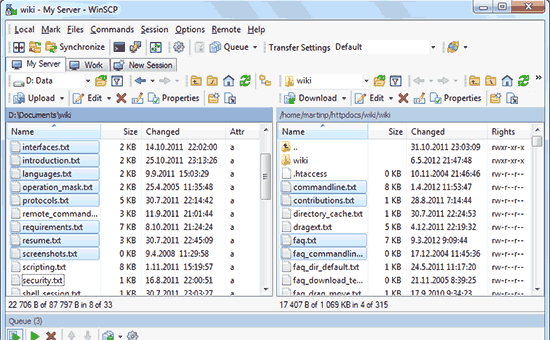
Web servers are used to host websites, web apps and other content on the Internet. Selecting the right server depends on a variety of factors, including your specific needs, deployment, operating systems, etc. Consider these options:
Local Servers
If you need to host a site for a small scale business, or if your website is small in size, a web server local may be the most suitable choice. These servers have been designed to be used for hosting websites and are more convenient and secure.
Open Source Web Servers
There are a wide variety of open source web servers to choose from, and each has its advantages and disadvantages. However, some stand out. Apache, Nginx Lighttpd Caddy and Lighttpd are among the best.

Apache is the web server of choice for more than half of all websites. It is open source, free to download and install, and offers a modular structure making it easy for developers to add new features and make adjustments to their site's configuration.
Nginx
Nginx provides a lightweight and highly-reliable web server. Many businesses use Nginx to serve static or dynamic content. The software supports SSL/TLS, HTTP authentication basics, virtual hosting as well URL rewriting.
Lighttpd
Lighttpd is a UNIX based webserver that aims for low resource usage, fast performance and a small footprint. It can be run on systems that have limited storage and memory without using more CPU power.
LiteSpeed
Another web server to consider is LiteSpeed, which was designed specifically for low-memory environments like home computers and embedded devices. This server was designed to overcome the resource challenges faced by other mainstream webservers. It is also one of the most resource-efficient options if you need a compact server that can handle large volumes of traffic.

Cherokee
This webserver was developed by an individual as a solution to a personal problem. Even though it doesn't have the most cutting-edge technologies like Nginx or Lighttpd does, it's still a viable option for people who are looking to host websites in an easy and simple to manage environment. It's easy-to-use interface makes it ideal for casual users.
Caddy
Caddy, unlike most web servers does not require additional software or scripts in order to work. Caddy is an excellent choice for people who don't know how to configure the Apache or Nginx servers.
This server's architecture is similar to Nginx. However, it handles requests asynchronously and in one thread. This can be helpful on systems with few CPU cores. It's not nearly as scalable Nginx or Lighttpd but can keep up with several hundred requests every second.
FAQ
Do I Need Any Technical Skills To Design And Build My Site?
No. It doesn't matter what HTML or CSS you know. Online tutorials can be found that cover both HTML and CSS.
How much do web developers make?
The hourly rate for a website you create yourself is $60-$80. However, if you wish to charge more, you can become an independent contractor. A typical hourly rate for a freelancer could be between $150 and $200.
Can I make my website using HTML and CSS?
Yes! If you've been following along so far, you should now understand how to start creating a website.
After you have learned how to structure a website, you will need to know HTML and CSS.
HTML stands for HyperText Markup Language. It is similar to writing a recipe. You'd list ingredients, instructions, and directions. HTML allows you to indicate to a computer which portions of text are bold, italicized and underlined. It also lets you know which part of the document is linked. It's the language for documents.
CSS stands for Cascading Style Sheets. This is a stylesheet for recipes. Instead of listing out each ingredient and instruction, you write down general rules for things like font sizes, colors, spacing, and more.
HTML tells the browser how to format a web page; CSS tells it how to do it.
Don't panic if either of these terms are confusing to you. Follow these steps to make beautiful websites.
Statistics
- It's estimated that chatbots could reduce this by 30%. Gone are the days when chatbots were mere gimmicks – now, they're becoming ever more essential to customer-facing services. (websitebuilderexpert.com)
- In fact, according to Color Matters, a signature color can boost brand recognition by 80%. There's a lot of psychology behind people's perception of color, so it's important to understand how it's used with your industry. (websitebuilderexpert.com)
- The average website user will read about 20% of the text on any given page, so it's crucial to entice them with an appropriate vibe. (websitebuilderexpert.com)
- Did you know videos can boost organic search traffic to your website by 157%? (wix.com)
- It enables you to sell your music directly on your website and keep 100% of the profits. (wix.com)
External Links
How To
How to use WordPress for Web Design
WordPress is a free software tool that allows you to create websites or blogs. You will find many features such as easy installation and powerful theme options. You can customize this website builder to suit your needs. It comes with hundreds of themes and plugins that help you make any site. If you would like, you can even add your own domain name. These tools will allow you to effortlessly manage your site's appearance as well as its functionality.
WordPress can help you create stunning sites even without knowing how to code HTML. If you don't know anything about coding, there's no reason why you shouldn't be able to set up a professional-looking website in minutes! We will walk you through basic steps to set up WordPress on your computer. We will explain everything so that you can easily follow along at your own pace.
The most popular CMS (Content Management System) out there is WordPress.com currently has around 25 million users worldwide and counting. There are two versions available for WordPress. You can either buy a monthly license or download the source codes and host it yourself for $29 each month.
WordPress is popular for many reasons. WordPress is simple to use. Anyone can create great-looking websites by learning HTML. Its flexibility is another advantage. WordPress.org provides many themes free of charge. You can easily change the look and feeling of your site without spending a dime. And finally, it is highly customizable. Many developers offer premium addons to allow you update posts automatically after someone comments. You can also integrate social media sharing in your site.